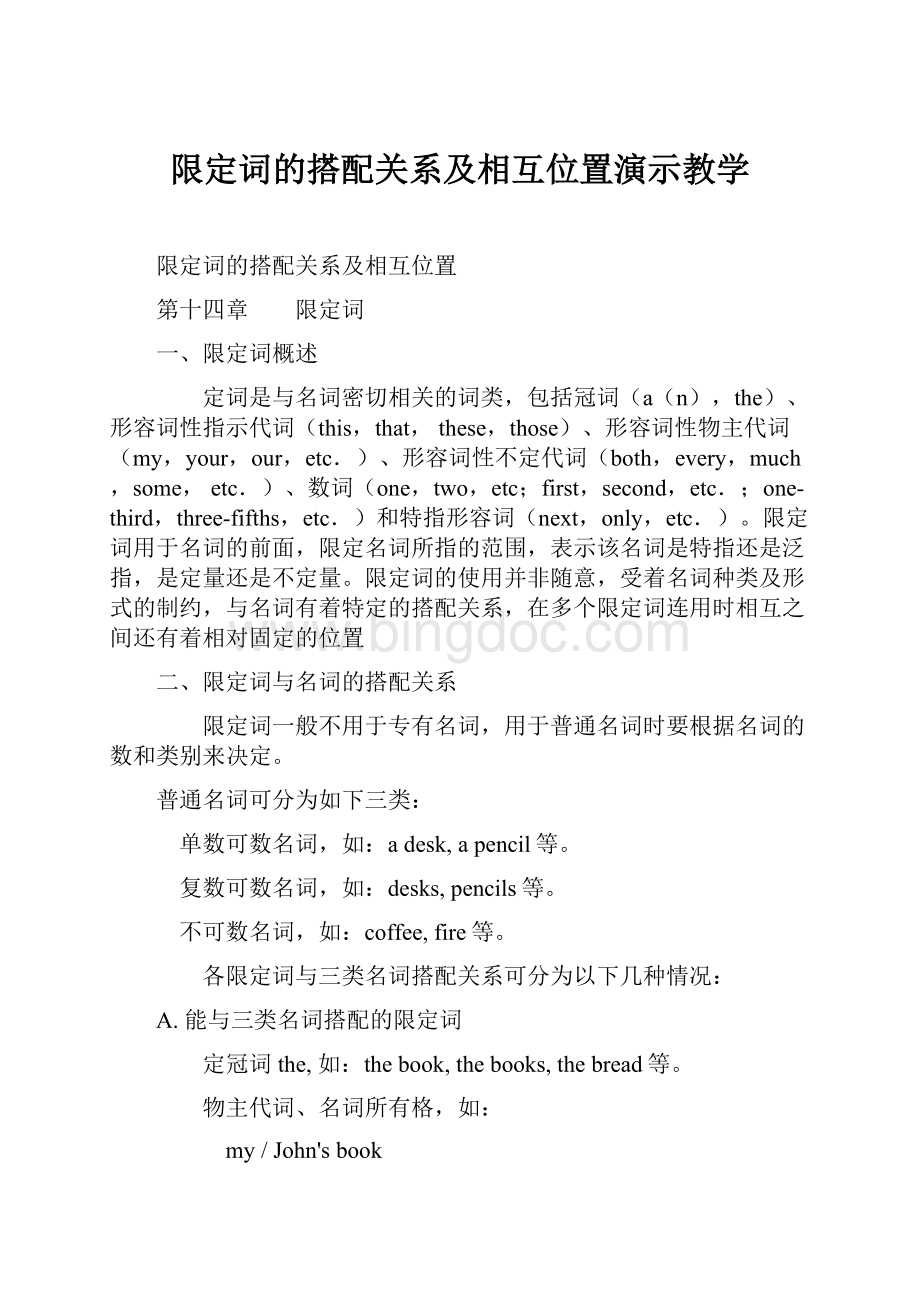限定词的搭配关系及相互位置演示教学Word下载.docx
《限定词的搭配关系及相互位置演示教学Word下载.docx》由会员分享,可在线阅读,更多相关《限定词的搭配关系及相互位置演示教学Word下载.docx(10页珍藏版)》请在冰点文库上搜索。

sbook
sbooks
sbread
all/some/any/no,如:
all/some/any/nobook
all/some/any/nobooks
all/some/any/nobread
other/such,如:
other/suchstudent
other/suchstudents
wh-words(eg.what,which,whose等)。
I'
msorryyouhadsuchterribleweather.
WhichJohndoyoumean,JohnthebakerorJohnthepostman?
Note:
such经常与不定冠词连用构成such+a(n)+adj+名词结构。
如:
I'
veneverlivedinsuchalargehouseasthisbefore.
Theyhaven'
thadsuchagoodtimeforages.
B.只能与单数可数名词搭配的限定词
如:
a(n),each,every,either,one等。
Itoldeverystudenttocome.
Sheknowseverypupiloftheclass.
Youmayuseeitherhoe.
C.只能与复数可数名词搭配的限定词
both,(a)few,several,these/those,a(great)numberof,two/three,many等。
We'
reaskingafewfriendsroundtodinner.
Agreatnumberofanimalsarekilledeveryyear.
Note:
many后面可以跟a(n)放在单数可数名词前,尽管还表示“许多”的意思,但动词用单数。
Manyamanisgoingtowelcometheforeignguests.
Manyafriendhasbeeninvitedtothisparty.
D.只能与不可数名词搭配的限定词
(a)little,abitof,agreatamountof,agreatdealof,much等。
InfactIknowabitofSpanish.
Alargeamountofmoneyisspentontobaccoeveryyear.
E.能与单数可数名词和复数可数名词搭配的限定词
thefirst/second,thenext,theother等。
What'
sthenextthingtodo?
Johnwantedtoknowwhattheotherdoctorssuggest.
F.能与复数可数名词和不可数名词搭配的限定词
alotof,plentyof,lotsof,enough,more,most等。
Thereisenoughfoodforeverybody.
Therearen'
tenoughtoolstogoaround.
G.能与单数可数名词和不可数名词搭配的限定词
(the)least,this,that等。
Hehadn'
ttheleastthoughtofhisowninterests.
Shefaintedattheleastsightofblood.
三、限定词与限定词的搭配关系
在名词词组中,当两个以上的限定词同时出现时,限定词之间就存在前后顺序问题,根据限定词不同的搭配位置,限定词可分为中位限定词、前位限定词和后位限定词。
前位限定词(Predeterminers):
all,both,half,double,twice;
onethird,twothirds等。
中位限定词(Centraldeterminers)包括:
冠词;
指示词(this/that/these/those);
形容词性物主代词,名词所有格(my,John'
s);
量词(some,any,no,every,each,either,neither,enough,much等);
wh-words(what,which,whose等)。
后位限定词(Postdeterminers):
基数词;
序数词;
last,next,other,another等;
such;
many,little,few,several,more,less等。
Theteacheraskedhisstudentstowritetheiranswersoneveryotherline.
老师要求学生隔一行写出答案。
Bothmybrothershavegraduatedfromuniversities.
我两个兄弟都大学毕业了。
Theoldmenhadaverygoodtimeduringalltheselastfewdays.
这些老人在最后一段日子里过得很愉快。
在限定词的搭配中,一般的顺序都是前位-中位-后位,中位限定词之间和前位限定词之间是互相排斥的,即:
两个中位限定词或两个前位限定词不能同时修饰中心词-名词,而后位限定词则可以并列修饰中心词。
MrHarrisonshowedusafewmoresamples.
TombrokehislegonNewYear'
sday.Ittookhimthenextfewweekstogetoverit.
汤姆新年那天摔断了腿,几个星期后才恢复。
Thegirl'
sparentsinvitedseveralhundredgueststoherbirthdayparty.
女孩的父母邀请了几百名客人参加她的生日晚会。
限定词使用规则:
限定词的分类比较复杂、难记。
一般情况下,可以运用以下几条简单、实用的规则。
A.把all和both放在其他限定词之前。
Thelittleboyateallthefood.
Allsuchproblemsshouldbeconsidered.
Bothmyhandswereseriouslyhurt.
B.把many/much,more/most,few/little放在其他限定词之后。
Hismanysuccessesmadehimfamous.
John'
sfewfriendsspeakhighlyofhim.
Withthesurrenderoftheenemytroops,nomorefightingwasexpectedthere.
C.感叹句中,把what和such放在a(n)之前。
Whatalovelygirl!
I'
veneverseensuchacrowd!
四、几组限定词的用法比较
(一)some,any,no的用法
some,any,no同是能与单数可数名词、复数可数名词和不可数名词搭配的限定词。
1.some和any表示“一些,若干几分”等含义,一般情况下,some用于肯定句,any用于疑问、否定、条件句中。
Haveyougotanyaspirins?
MrWhitehassomeflowersinhisgarden.
Wehaven'
tinvitedanystudentstotheparty.
Ifyouwantanyglasses,I'
llsendyousome.
2.any还可以用于实际上含否定意思的肯定句中。
例如,含有never,without,hardly等词的肯定句。
Theyoungaccountantseldommakesanyerrorinhisbooks.
Icanansweryourquestionswithoutanyhesitations.
Thenoiseofthepartypreventedmefromgettinganysleep.
3.some可以与others连用。
Somepeoplelikethesea,otherspreferthemountains.
SomestudentsansweredYesandothersansweredNo.
4.如果说话人预期肯定回答时,some也可用于疑问句。
Don'
tyougivehimsometickets?
"
vejustbeenshopping."
"
Oh,didyoubuysomerice?
”
some还可用在表示劝请、请求、命令的疑问句中。
Won'
tyouhavesomemorebeer?
Couldyoubuymesomeclips?
5.any用于肯定句中,表示“任何,无论哪一个”。
Anychildwouldknowthat.
6.No的含义相当于notany(a)。
Nocigaretteiscompletelyharmless.
Therewerenolettersforyouthismorning.
no和any相似,它不能与另一个限定词连用。
与the,my,this,that等相遇时用noneof代替。
Noneofmyfriendslivenearmyhouse.
Ilikenoneofthatmusic.
no可以和一个带-ing的动词连用,表示不允许干某事,这时不能用notany代替。
NoSmoking!
不准吸烟!
NoParking!
禁止停放车辆!
NoWaiting!
禁止(车辆等)在此等候!
7.有时no的意义不止是not(a)或notany,而是notatall(完全不是,决不是)。
Heisnofool.
(=Heisnotafool.)
Itisnoeasytask.
(=Itisnotaneasytask.)
(二)all,both,every,each,either,neither的用法
1.all,both同属前位限定词,但all可以与三类名词搭配,both只能与复数可数名词搭配,从意义上讲both指两者,all指三者或三者以上。
Howmuchtimewillyoutakeforallthiswork?
Allchildrencanbenaughtysometimes.
IgotboththesevasesinSpain.
Bothcatsareasleep.
all和both用于否定时表示部分否定。
例如:
Icannotpromotebothofyou.
我不能使你们两个都提升。
Allflowersinhisgardenarenotred.
他花园里的花并非都是红色的。
Both(ofthem)arenotmybrothers.
他们两个之中,只有一个是我的兄弟。
另外,表示部分否定的词还有every(everyone)。
Everymancannotbeapoet.
并非人人都可以成为诗人。
要表达全部否定要用none/no(nobody),neither,either等。
Icannotpromoteeitherofyou.
你们两个我都不能提拔。
Noflowerinhisgardenisred.
他花园的花都不是红的。
2.all和every从意义上十分相近,都用来泛指人或物,然而两者各自与名词搭配的类别不同,every只能与单数可数名词连用。
AllMondaysarehorrible.
(=EveryMondayishorrible.)
all后可以跟the或this,my等限定词,而every却不行。
Alltheboysofthisclassareabletorunfasterthantheirteacher.
试比较:
Shewashereallday.她在这里呆了一整天。
Shewashereeveryday.她天天都在这里。
3.every和each同属中位限定词,都可与单数名词连用,且意义相近,表示‘每个’,然而every和each并不完全一样,every强调整体概括,each则表示个别概念。
Eachdayisbetterthantheonebefore.
一天比一天好。
Everyplayerwasingoodform.
每个运动员都处于最佳状态。
如果不特别强调某一意义时,every和each可以互换。
Wewanteverychildtosucceed.
我们希望每个孩子都成功。
Eachchildwillfindhisownpersonalroadtosuccess.
每个孩子将会找到他个人的成功之路。
each可以指两个或两个以上的人或东西,every却不能指两个,只能指三个以上的数量。
Each*hasitsownphysicalandpsychologicalcharacteristics.
男女各有其身体上和心理上的特点。
(不能说every*...)
另外,如有其他限定词同时修饰中心词,each可作代词取eachof的形式,而every则只能作限定词。
EachofmyparentsgavemepresentsforChristmas.
过圣诞节时我父母每人都给我送了礼物。
4.either和neither同属中位限定词,与名词连用时不能和其他限定词同用(如冠词,物主代词,或指示代词)。
either和neither都只修饰单数可数名词,动词也用单数。
EitherdayisOK.
两天中哪一天都行。
NeithercarisexactlywhatIwant.
这两辆车都不是我想要的。
Thereweretreesandflowersoneithersideofthestreet.
街两旁都有树和花。
Eitherkindofschoolisquitesuitable.
两种学校都挺适合。
either也可指‘两个都’与both的意义相近,但both后接复数名词,either则只接单数名词,而且both还可与其他限定词搭配。
Both(of)mychildrenhavebeentoAmerica.
另外,当either,neither与其他限定词连用时,则使用eitherof,neitherof结构。
Eitherofthegirlsisquitecapableofthework.
两位女孩都能胜任这项工作。
Neitherofhiscatshasbeenfed.
他的两只猫都还没喂。
注意:
此时动词用单数,不能用复数。
但在否定句中却常用复数,neitherof后单复数动词都可以,只是复数常用在非正式文体中。
例如:
Idon'
tthinkeitherofthegirlsarecapableofthework.
我认为这两个女孩都不能胜任这项工作。
Neitherofyourtwoanswersiscorrect.
你的两个回答都不正确。